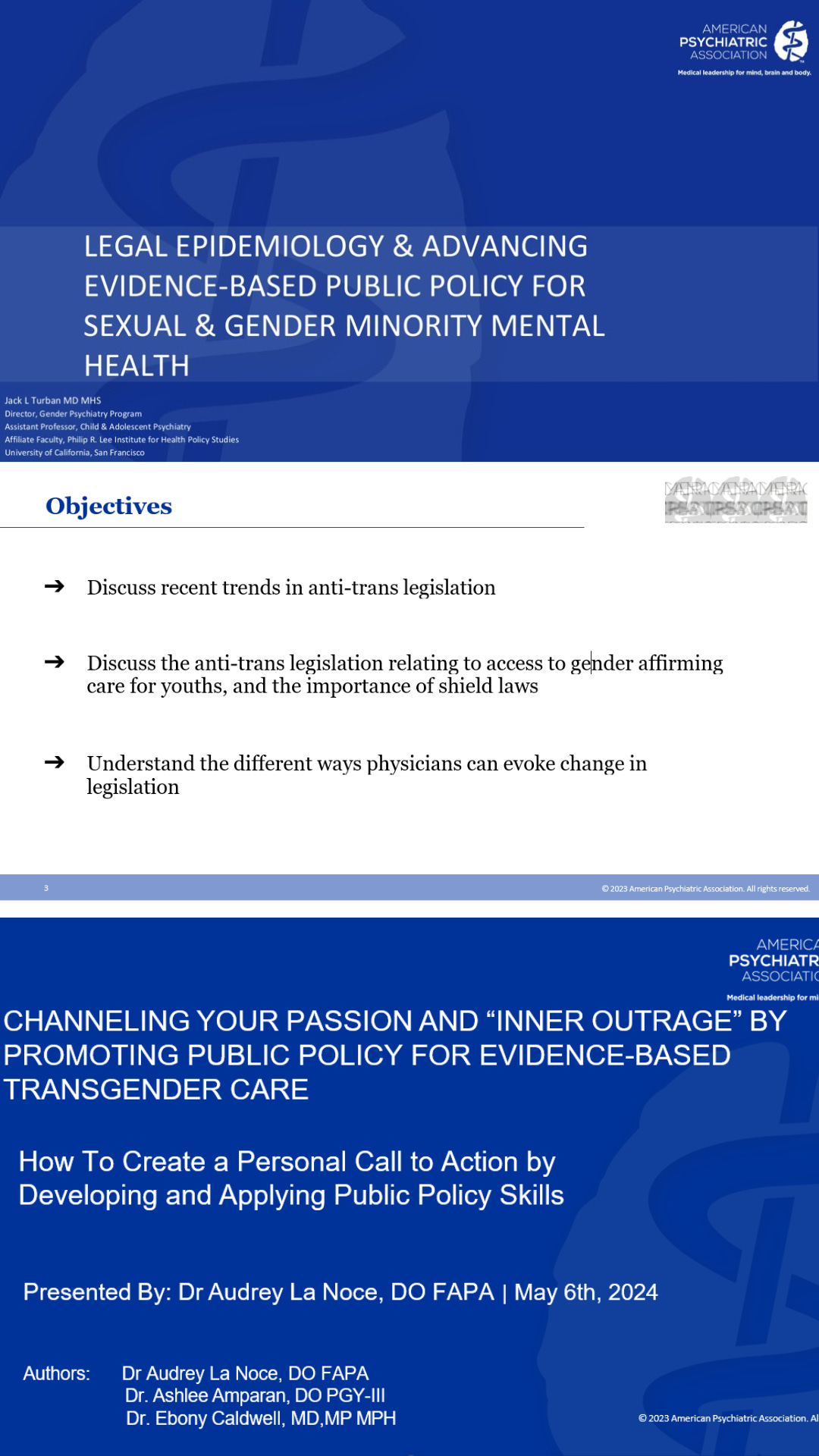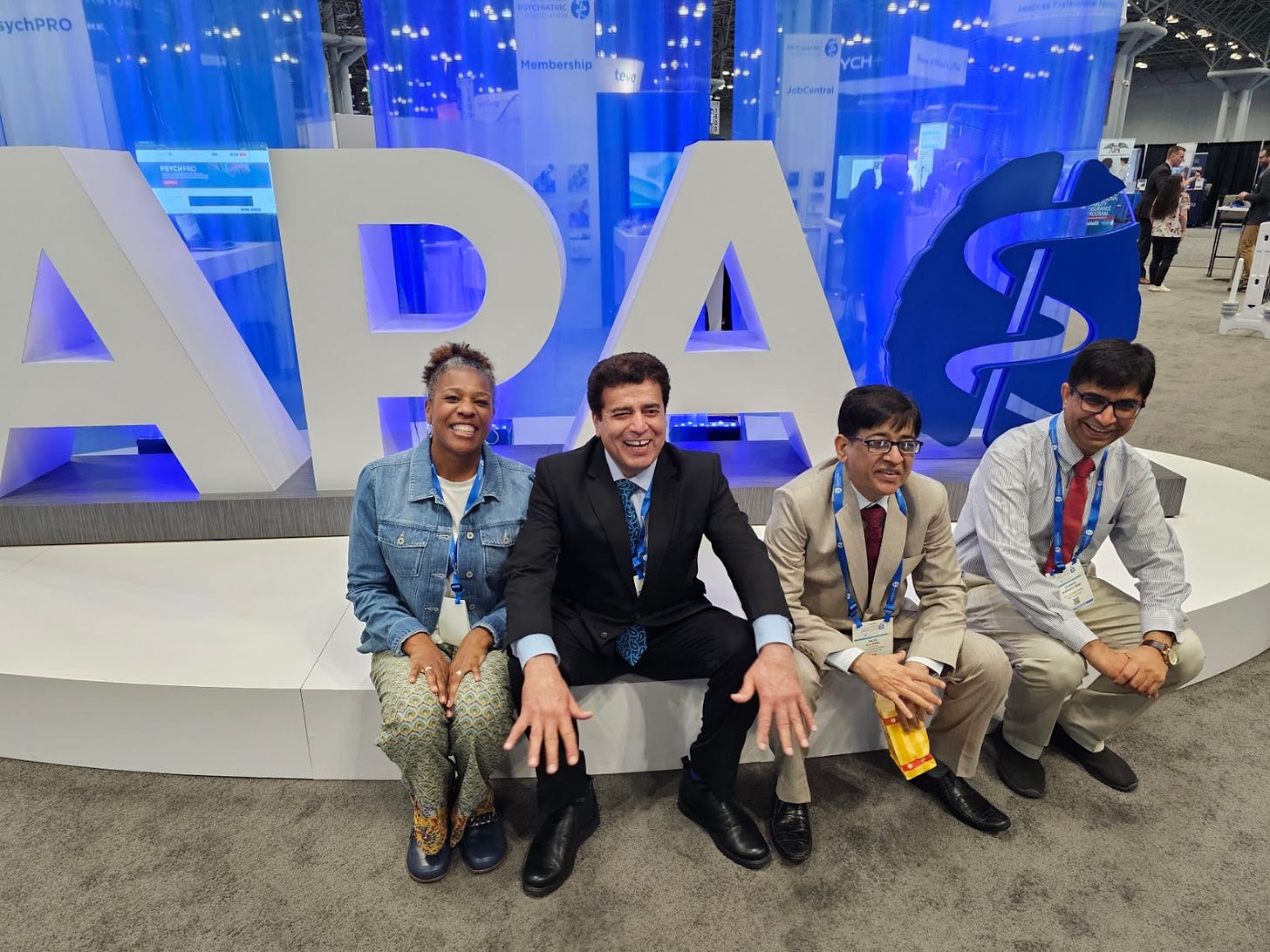Evidence in Exile
FAIR’s fight for evidence-based dialogue about gender-affirming care at the American Psychiatric Association annual meeting
On May 3rd, I traveled to New York City for my first major assignment as the newly appointed Interim Director of FAIR In Medicine (FIM), attending the 2024 American Psychiatric Association annual meeting. The Jacob K. Javits Convention Center welcomed more than 9,000 in-person attendees and an unknown number of virtual attendees to learn the latest scientific evidence from conference presenters. In addition to various psychiatric issues, the conference covered a number of controversial topics, such as DEI, gun safety, climate change, and the Ukraine-Russia war. But when it came to the subject of gender-affirming care, the APA enforced an orthodoxy and did a disservice to both to patients and APA members, who clearly want robust debate on this important topic.
American and international members and non-members attended the APA meeting. The conference theme, “Confronting Addiction From Prevention to Recovery,” featured over 500 educational sessions and more than 1,000 research poster presentations with topics including addiction, mood disorders, and other psychiatric diagnoses. The meeting hosted exhibitors, mostly pharmaceutical and device companies, job recruiters, residency program recruiters, and a bookstore where attendees could purchase materials published by APA members.
FAIR planned to staff a table in the exhibition hall and talk with psychiatrists and other health professionals about the research on gender-affirming care for youth. Among those who planned to talk with attendees were whistleblower Jamie Reed, head of the LGBT Courage Coalition, and psychotherapist Paul Garcia-Ryan. We also lined up members of LGB Alliance USA and I Have Concerns, detransitioners, and educated members of FAIR.
We aimed to share evidence-based resources about the existing treatments for children with gender confusion. That includes a summary of the UK’s final Cass Review—a 388-page report on available evidence for youth gender medicine based on information specific to clinics in England and international systematic reviews and guidelines —and journal articles and books written by American writers. It also included editorials written by American journalists just days after the Cass Review was published, urging a more evidence-based look at the issue in the United States.
We also planned to have a copy of the APA textbook Gender-Affirming Psychiatric Care. We would ask attendees to read FIM’s open letter requesting the APA revise its policies and textbook to reflect quality scientific data and to sign if they agreed.
Since members of our team attended the American Academy of Pediatrics conference previously with the same aim, we were prepared to encounter people who would vehemently disagree with our presence and be openly angry or even hostile. We planned for our exhibit booth to be a source of information, encouragement, and support for those with questions and concerns about the issue needing support and encouragement, and those who had little knowledge about gender identity and children and were open to learning.
Unfortunately, we never had the chance. I learned that event organizers had canceled our exhibitor booth reservation without any explanation. I also received a message in the meeting mobile app that an organizer had personally removed me from the event.
Undeterred, we adapted our strategy to engage as many attendees as possible around the Javits Center. This effort underscored a clear desire among APA members for alternative perspectives on the model of gender-affirming care.
I focused on attending sessions to learn what the “experts” had to say about the gender-affirming care of minors. Generally, the speakers took for granted that the audience accepted their views, and failed to present a balanced review of the evidence. Their presentations lacked details of the study methods, forcing skeptical attendees like me to look up the data ourselves.
Most attendees just sat and absorbed information without asking questions. However, psychiatrists from other nations, such as Canada, Finland, and the Netherlands, were much more willing to ask questions and raise concerns about how the panelists addressed controversial topics than American psychiatrists.
There were five sessions total about transgender care. The World Professional Association for Transgender Health (WPATH), the leading international organization for transgender health, was often cited as the guiding body. England’s Cass Review—which is to date the most comprehensive systematic review of evidence for “gender-affirming” care—had been published just a few weeks prior and found that there is “remarkably weak evidence” for the current practices of gender-affirming care. Yet it was only introduced once by any panelist, and was otherwise mentioned only by audience members.
Dr. Jack Turban, an epidemiologist, child and adolescent psychiatrist, and Director of the Gender Psychiatry Program at the University of California, San Francisco, posted a thread on X citing his concerns with the Cass Review. He held a 30-minute coffee session at the APA meeting, during which he repeated these concerns. However, there was limited time for discussion or debate.
The other four sessions were each 90 minutes long and allowed time for questions and comments. Self-described “LGBTQ+-affirming” psychiatrist Dr. Eric Yarbrough’s session, “Transgender Mental Health,” was the only one who presented in a relatively balanced and nuanced fashion. Dr. Yarbrough entertained questions and comments throughout his presentation.
The last session, titled “Channeling Your Passion and ‘Inner Outrage’ by Promoting Policy for Evidence-Based Transgender Care,” was by far the most politically charged session on this topic. It was delivered by five presenters who were all clearly biased towards gender-affirming care for youth, and was entirely dedicated to getting audience members to lobby for it.

I and three psychiatrists stood up to ask questions and raise concerns about information that these panelists presented which contradicted the findings of the Cass Review. All of us were interrupted numerous times by Dr. Turban and audience members who would not entertain any discussion that didn’t confirm that gender affirmation mitigated suicide rates and gender distress. At one point, an audience member demanded to know the name and credentials of a woman as she began to frame her comment.
Before one session, I introduced myself to APA president Dr. Petros Lavounis. I expressed my concerns about the harms of puberty blockers and sexualizing hormones on children, and the lack of caution taken by the APA in its guidance on gender-affirming care. I also asked him to comment on the Cass Review and why the APA was not following European nations in scaling back gender-affirming prescriptions for minors. He refused to answer my question, told me that “this isn’t the appropriate time or venue,” and directed me to the media center.
Our team shared resources and information outside the convention center with conference attendees, exhibitors, and passersby. Most health professionals expressed disinterest or avoidance and walked briskly past us. But many mouthed their approval or thanked us aloud.
I also sought out medical students and residents to hear what they had learned or been taught about gender medicine. I found that most had very little education about gender medicine unless they sought it out on elective rotations. Still, they were the most open to receiving new information, which gave me hope for young, future physicians to approach the issue with care. Only a handful of people made rude remarks while walking past but didn’t engage further. One person who initially completely disagreed with us stopped to listen to what we had to say, and ended up signing our open letter and donning an “I have concerns” sticker. This is how we turn the tide: by having honest conversations with those we disagree with.
My experience at the 2024 American Psychiatric Association annual meeting underscores a profound disconnect between the guardians of established medical doctrines and the burgeoning need for open, evidence-based discourse on gender-affirming care. Despite facing unexpected barriers and outright dismissal, FAIR’s commitment to fostering informed discussions proved both necessary and impactful. Engaging directly with psychiatrists and health professionals, we witnessed the profound value of open dialogue and healthy skepticism—principles that should anchor all medical practices, especially those involving vulnerable populations like minors.
The APA’s resistance to diverse viewpoints not only stifles scientific progress but also betrays its duty to uphold the highest standards of care for those grappling with gender dysphoria. As we move forward, it is imperative that the medical community embraces a more transparent approach to controversial topics, ensuring that care is anchored in robust, comprehensive research. Let this experience be a clarion call to all medical professionals: the integrity of our practices and the trust of the public depend on our courage to question, explore, and openly debate every aspect of the care we provide. Only through such rigor can we truly safeguard the well-being of our patients and uphold the noble ethos of medicine.
We welcome you to share your thoughts on this piece in the comments below. Click here to view our comment section moderation policy.
The opinions expressed here do not necessarily reflect those of the Foundation Against Intolerance & Racism or its employees.
In keeping with our mission to promote a common culture of fairness, understanding, and humanity, we are committed to including a diversity of voices and encouraging compassionate and good-faith discourse.
We are actively seeking other perspectives on this topic and others. If you’d like to join the conversation, please send drafts to submissions@fairforall.org.







Thanks for your courage and perseverance. What a stressful situation to be blocked and interrupted at a professional meeting.
I'm a psychiatrist. I attended the APA meeting once--and never again--because it was abundantly clear that the whole thing is irretrievably corrupted by its pharma and medical device sponsors. At that time (2001) the message was that Oxycontin was wonderful and non-addictive--and that there was an "epidemic of untreated pain in this country"--- and that we were bad doctors if we let even the slightest pain go untreated with this wonderful new drug. I'm embarrassed to say that I brought home a lovely (free) flashlight with the Oxycontin logo on it, though I'm happy to say that I never once prescribed the drug.
It doesn't surprise me that they wouldn't let you in the exhibit hall. You might upset the people paying the bills and that, sadly, is what the APA cares about. Well, that and the ubiquitous virtue-signalling which all organizations now seem to feel the need to do.
I wrote about my experiences at the APA meeting on our Substack: https://pairodocs.substack.com/p/he-who-pays-the-piper-part-2